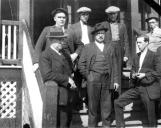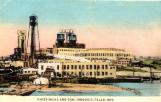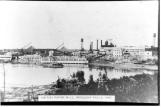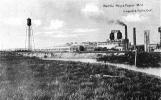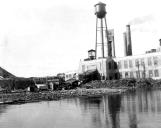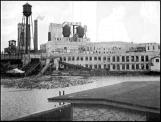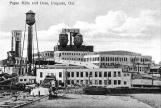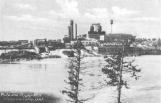2
The Success of Anson's FollyThe romantic tale of how Frank Harris Anson founded the Abitibi Power and Paper Co. and gave life to the town of Iroquois Falls.
It is set in the sleepy year of 1909, before roads before rails and certainly long before air travel came to Northern Ontario. The land was rugged and wild, inhabited mostly by a few bands of Indians and a number of trappers, who dared to brave the harsh elements. Travel was difficult at the best of times. The forest so dense and ridden with flies and mosquitoes, they were considered unfit for safe travel. A canoe became the most effective form of transportation, despite the dangerous waterfalls and unpredictable currents. Explorers have always been attracted to the challenges of the north and prospectors were uncovering rich, rewarding minerals beneath its sleeping surface.
Rumors of such finds were circulating throughout the business world and it was only a matter of time before they reached the ears of Frank Anson.
The history of Mr. Anson is that he was certainly renowned as a very astute businessman. Born in Niles, Michigan on October 26, 1859, he grew up in fairly average surroundings. He did however gain some business knowledge working for his father, producing flour barrels. His next job presented him with quite a challenge, spending a couple of years surveying the wild, wild west for a railway company. Later, he tried his hands as Railway Passenger Agent but it seems this position did not appeal to him for long.
Being a young man, he decided to try his hand at exploration. He headed first to South America where he hoped to discover wild rubber on the Orinoco River. Upon his return to America, He promptly took up business with a flour mill. It was here that he found his calling.
After several selling sprees, his company sent him to Canada to purchase more flour to fill the orders he had acquired. During one such trip he became acquainted with the Ogilvie Flour Co. and it was this relationship that brought Frank Harris Anson to Canada to reside.
He quickly established himself as one of the most competent businessmen in Montreal. He proved himself to a salesman extraordinaire, as well as showing the leadership skills that would later result in tremendous growth for Northern Ontario. But that is getting ahead of ourselves, for actually it was not Anson's idea to head North, it was first suggested to him by two McGill University students. One day when Mr. and Mrs. Anson brought their car in for repairs and the two students approached and discussed with them with their ideas.
They had heard about the Porcupine gold rush and wanted to see for themselves if this area was rich and prosperous as the rumors were indicating.
Anson bold and adventurous spirit revealed itself again as he put up $1,000.00 for the excursion for Northern Ontario. So they were off, optimism in hand for the enterprise they hoped to uncover. It must have been a tremendous disappointment for them to have to return without news of glittering gold and fantastic mining opportunities. But then they really did not return empty handed. They did report they had seen unbelievable forests and a powerful flowing river that would be perfect for a mill.
They had planted the seed in precisely the right mind and he soon made the trip himself. Wanting to see first hand the frontier that held such opportunity for a man of his capabilities. He must have agreed with the students and quickly began the preparations for the mill, despite the scorn and misgivings of his colleagues. The Abitibi Power and Paper Co. became known as "Ansons' Folly" in certain circles of Montreal.
By the year 1912, no one could dispute the advancement Anson had made in Northern Ontario. Building supplies and materials had to be floated down the river as the rail service was still not in operation. A dam was constructed and the power plant established in spite of the difficult working condition. After two years of trying work and set backs, the mill was ready for operation and the first pulp was produced August 4th, 1914. From this point, the industry grew by leaps and bounds. The growth continues to this day. New paper machines, automation and safer procedures on are an ongoing priority.
Anson finally achieved the recognition he deserved and the respect of the business world that had doubted him. He developed a community next to the mill along the most modern of themes. Iroquois Falls became known as Ontario's Original Model Town. Anson proved top be a classy man who spared no expense when it came to the comfort and moral of his employees. It is just this concept that gave Iroquois Falls those standards we have come to accept as life.
Frank Harris Anson died on November 1, 1923, leaving behind the legacy that stands today, where he built it, on the banks of the mighty Abitibi River.

